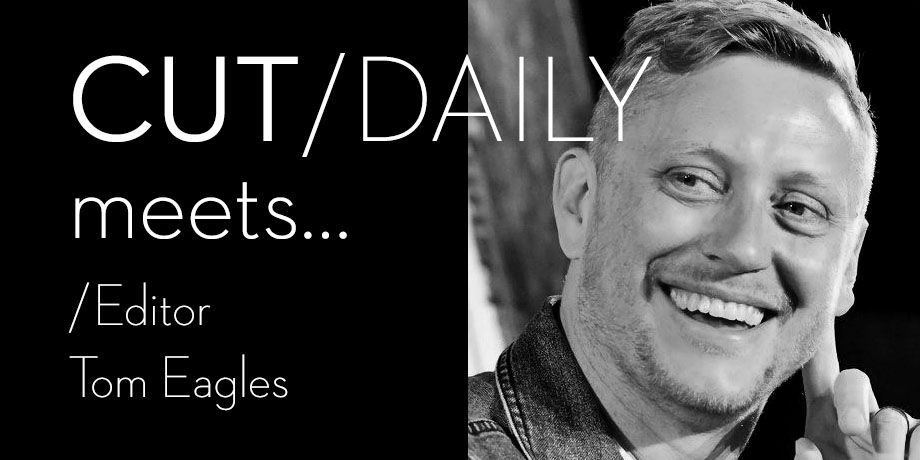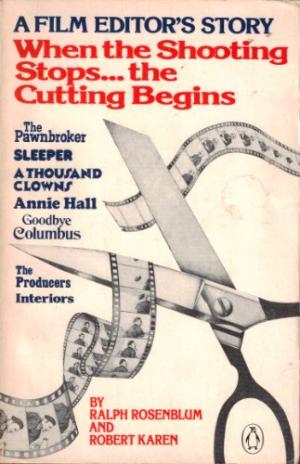#150 - Cut/daily Meets... Editor Tom Eagles

To celebrate issue 150 of Cut/daily please enjoy this special instalment of Cut/daily Meets... with Oscar nominated editor Tom Eagles.
Tom's latest project is The Harder They Fall, which recently had it's world premiere at the London Film Festival with Jay-Z and Beyonce in attendance.
So you know, no big deal.
It's out now 'in select theatres' and will premiere worldwide on Netflix on Wednesday November 3rd 2021.
Cut/daily Meets... is our bi-monthly interview series which takes you inside the roles and careers of post-production professionals from across the industry.
In this issue I particularly appreciated Tom's perspective on why "Good art, in my experience, is always in flux." And how that works itself out in post-production on a daily basis.
What’s your daily work routine?
It changes from project to project and depending what stage we are at.
For the shoot period on The Harder They Fall I was working remote from Aotearoa. So the first thing I would do in the morning was check in with my assistant John Sosnovsky, find out about any technical or logistical issues.
Then I just start watching dailies.
I try to hold off cutting for as long as possible, watch as much as possible before I begin forming the scene. But I do start to get ideas as I watch the material, the scene starts to form in my head.
Where should it start, where should it end? Often there’s a climax or turning point in the scene. I figure out how I want to play that and then sometimes work backwards from there.
Performances are key and oftentimes you’re balancing the screen grammar that the scene seems to want versus what the actor did. Maybe there’s something they did that you really like, but it’s in an odd frame - so then you have to figure out how to get there, how to make that shot make sense and for the performance and rhythm and the sequence of shots to feel seamless and intentional.
Once I have a cut I like I might start playing with music and sound. This part of the process is really fun for me and the scene starts to come to life in the sense that it becomes something I could play for someone else, without asking them to fill in all the blanks.
It sometimes informs the picture editing as well - by putting sound on you may find that you need more space in the aftermath of an event, say a gunshot. But music especially in this film was a conversation - I was constantly cutting both the music and the pictures to interact with each other in the right way.
What do you now know about your work that you wish you’d known when you first started?
Not to be too rigid.
The piece is constantly evolving and changing until it’s eventually abandoned.
Keep going back to the dailies and view things from a different angle, a different intention.
I used to have a lot of faith in my first instinct, which was a function of working on very fast turnaround television - there really was no time for second guessing or going back. But on a feature your objectives can change over time, you can learn something about a character that makes you reevaluate.
What did your biggest professional failure teach you?
Early on in my career I did a film which I should never have done. The sense of humour was way broader than my sensibility, it was in a language that was unfamiliar to me, and the director wasn’t really looking for a collaborator.
I was just the wrong person for that project, but at the time I allowed myself to be flattered and cajoled into the role. It was early on and I didn’t have anything else going at the time, and I felt I needed all the experience I could get.
I had a good time and got on well with the director, but it was a total mismatch. It taught me to choose my projects and collaborators carefully - because a feature is going to be your life for anything from six months to two years, and at the end of that you want to have a piece of work you can stand behind. Thankfully I’ve never had a repeat experience.
What’s the #1 thing that has helped you shorten your craft’s learning curve?
I’m sorry I’m really blanking in this one. I’ll make up for it by being overly long and digressive with the rest :)
What book has helped you the most over your career?
I read the Murch books In the Blink of an Eye and The Conversations a long time ago. They’re great books and I agree with him on most things.
However there’s a side of me that’s resistant to any kind of formula. It feels like explaining the force - midichlorians or whatever. I operate on instinct and everything else is post-rationalizing.
I also enjoyed Ralph Rosenblum’s chapter on Annie Hall in his book. That was a movie that had always intrigued me, because it’s so unique structurally. I’m interested in scriptwriting, so I had sought out the script, but it was implausibly close to the finished film, like a transcript. I remember thinking ‘this can’t be right, no one writes like this.’
And then lo and behold Rosenblum details how they restructured the thing from an ensemble piece about Woody Allen’s ‘anhedonia’ down to focus on the relationship between him and Diane Keaton.
I had already done some pretty dramatic restructuring on a couple of movies by the time I found that book, so it was kind of revelatory, I felt seen :)
Why do we have this idea that the thing is good if it doesn’t change, if it’s static? Good art, in my experience, is always in flux. From writing to shooting to editing right up until the moment you release it, and in some ways after too.

Probably the most useful book is whatever I’m reading at that point in time.
I read a lot of contemporary fiction. It’s always interesting to see different ways that people tell a story. And I’m always adapting it in my head, it’s an unconscious habit I can’t shake.
I recently finished Viet Thanh Nguyen’s The Sympathizer and The Committed, a very dark comedy about the Vietnamese diaspora and geopolitical intrigue. These would make a great limited series!
And your parting piece of advice?
Get on TikTok.
I feel like TikTokers understand the inherent power of a cut. The potential for suspense, humour and surprise.
This is something a lot of industry folks could learn from!
If, like me, you’re too old for TikTok, tell your kids stories.
It’s great storytelling practice and they’ll let you know pretty quick what’s not working for them!
Thanks so much Tom!
So remember, stay in flux and cut daily.
Take This Further
- An in-depth Art of The Cut interview with Tom on The Harder They Fall
- Tom is interviewed by Martin Carr for Flickering Myth
Save money in Post with Cut/daily Code of the Week
For this week only get 20% off new or existing licenses for Hedge, my favourite, beautifully designed offload, backup and checksum verification tool.
Catch up on the latest functionality and save 20% when renewing too! In Hedge's Preferences, go to License > Buy Updates... and add CUTDAILY-142 at checkout.
